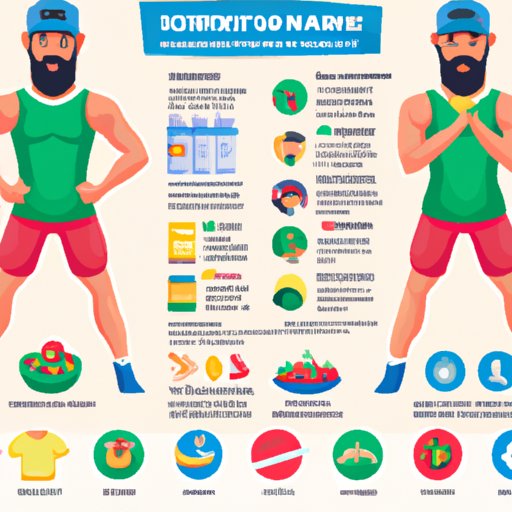
Introduction
For ages, it has been a common belief that protein is essential to build muscle. However, with more people adopting vegan and vegetarian lifestyles, there has been a debate on whether one can build muscle without protein. In this article, we’ll explore the science behind muscle growth, debunk the protein myth, and discuss non-protein sources that can aid in muscle growth.
Debunking the Protein Myth: How to Build Muscle on a Plant-Based Diet
The protein myth is that it is the only macronutrient needed to build muscle. However, muscles also require carbohydrates, healthy fats, vitamins, and minerals. In fact, muscles are made of 75% water, with protein making up a mere 20-25% of the actual muscle. A plant-based diet can provide all nutrients required for muscle growth.
Plant-based protein sources include lentils, chickpeas, nuts, seeds, quinoa, tofu, and tempeh. These sources also have the added benefits of fiber and phytonutrients, which aid in digestion and fight inflammation. Eating enough calories is crucial for muscle growth, regardless of whether you’re consuming protein or not. A calorie surplus will provide the energy needed for workouts and the synthesis of new muscle tissue.
The Science Behind Muscle Growth: Exploring Non-Protein Sources for Building Muscle
Muscle growth is a complex process that involves the rebuilding of muscle fibers that have been broken down during exercise. Muscle (hypertrophy) occurs in response to mechanical tension, time under tension, and metabolic stress.
Carbohydrates provide the fuel to power workouts while healthy fats aid in the absorption of vitamins and minerals. Hydration is critical for muscle growth since muscles are primarily made of water. Adequate hydration helps with nutrient absorption and assists with recovery.
Antioxidants and anti-inflammatory foods, such as berries, leafy greens, and ginger, play a crucial role in muscle recovery by reducing inflammation and preventing muscle damage after exercise.
Vegan Muscle Building: Tips and Tricks for Getting Strong Without Protein
Strength training is the most effective way to build muscles. Strength training involves resistance exercises that target specific muscle groups. Compound exercises, which use multiple muscle groups simultaneously, are great for building muscle in less time, such as squats, lunges, and deadlifts.
Getting enough sleep is vital for muscle recovery since the body repairs muscle tissue while you sleep. The goal should be to get at least seven to eight hours of uninterrupted sleep each night.
Vegans who want to build muscles should create a meal plan that includes a variety of plant-based foods rich in carbohydrates, healthy fats, and micronutrients. Plant-based protein powders are also a great option for vegans looking to supplement their diet.
The Top Nutrient Alternatives to Protein for Building Muscle
Creatine is a natural compound found in muscle cells that is responsible for providing energy to muscle cells. Beta-alanine is an amino acid that has been found to increase muscle power output. Branched-chain amino acids (BCAAs) are essential amino acids that are metabolized in the muscles instead of the liver.
While these nutrients can aid in muscle growth, they do not replace the importance of adequate nutrition and strength training. Plant-based sources of creatine include beans and nuts, while beta-alanine can be found in spinach and mushrooms.
Beyond the Steak: How Vegetarians and Vegans Can Build Muscle Without Protein
Many vegetarian and vegan athletes have successfully built muscle without consuming animal-based protein. One such athlete is bodybuilder Nimai Delgado, who has been vegan since birth. He credits his muscle gains to strength training, adequate nutrition, and a positive mindset.
It’s essential to track progress with measurements and photographs and to make adjustments to your workout and diet plans as needed. It takes time to build muscle, so don’t get discouraged if you don’t see results right away.
Conclusion
Protein is not the only way to build muscle. A plant-based diet can provide all the required macronutrients and micronutrients needed for muscle growth. Strength training, adequate sleep, and hydration are also essential for building muscle. By incorporating these tips and tricks, individuals can build muscle without relying solely on protein supplements.





